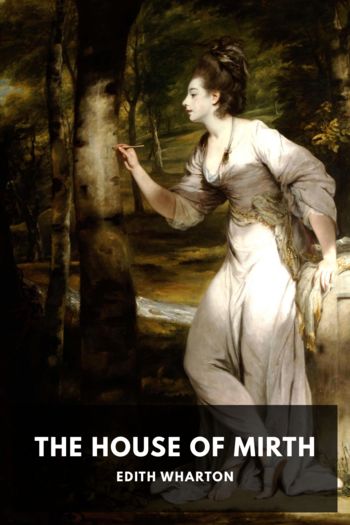The Age of Innocence - Edith Wharton (8 ebook reader .txt) 📗

- Author: Edith Wharton
Book online «The Age of Innocence - Edith Wharton (8 ebook reader .txt) 📗». Author Edith Wharton
He was conscious that Madame Olenska was looking at him under lowered lids. “I have done what you wished—what you advised,” she said abruptly.
“Ah—I’m glad,” he returned, embarrassed by her broaching the subject at such a moment.
“I understand—that you were right,” she went on a little breathlessly; “but sometimes life is difficult … perplexing …”
“I know.”
“And I wanted to tell you that I do feel you were right; and that I’m grateful to you,” she ended, lifting her opera-glass quickly to her eyes as the door of the box opened and Beaufort’s resonant voice broke in on them.
Archer stood up, and left the box and the theatre.
Only the day before he had received a letter from May Welland in which, with characteristic candour, she had asked him to “be kind to Ellen” in their absence. “She likes you and admires you so much—and you know, though she doesn’t show it, she’s still very lonely and unhappy. I don’t think Granny understands her, or uncle Lovell Mingott either; they really think she’s much worldlier and fonder of society than she is. And I can quite see that New York must seem dull to her, though the family won’t admit it. I think she’s been used to lots of things we haven’t got; wonderful music, and picture shows, and celebrities—artists and authors and all the clever people you admire. Granny can’t understand her wanting anything but lots of dinners and clothes—but I can see that you’re almost the only person in New York who can talk to her about what she really cares for.”
His wise May—how he had loved her for that letter! But he had not meant to act on it; he was too busy, to begin with, and he did not care, as an engaged man, to play too conspicuously the part of Madame Olenska’s champion. He had an idea that she knew how to take care of herself a good deal better than the ingenuous May imagined. She had Beaufort at her feet, Mr. van der Luyden hovering above her like a protecting deity, and any number of candidates (Lawrence Lefferts among them) waiting their opportunity in the middle distance. Yet he never saw her, or exchanged a word with her, without feeling that, after all, May’s ingenuousness almost amounted to a gift of divination. Ellen Olenska was lonely and she was unhappy.
XIVAs he came out into the lobby Archer ran across his friend Ned Winsett, the only one among what Janey called his “clever people” with whom he cared to probe into things a little deeper than the average level of club and chophouse banter.
He had caught sight, across the house, of Winsett’s shabby round-shouldered back, and had once noticed his eyes turned toward the Beaufort box. The two men shook hands, and Winsett proposed a bock at a little German restaurant around the corner. Archer, who was not in the mood for the kind of talk they were likely to get there, declined on the plea that he had work to do at home; and Winsett said: “Oh, well so have I for that matter, and I’ll be the Industrious Apprentice too.”
They strolled along together, and presently Winsett said: “Look here, what I’m really after is the name of the dark lady in that swell box of yours—with the Beauforts, wasn’t she? The one your friend Lefferts seems so smitten by.”
Archer, he could not have said why, was slightly annoyed. What the devil did Ned Winsett want with Ellen Olenska’s name? And above all, why did he couple it with Lefferts’s? It was unlike Winsett to manifest such curiosity; but after all, Archer remembered, he was a journalist.
“It’s not for an interview, I hope?” he laughed.
“Well—not for the press; just for myself,” Winsett rejoined. “The fact is she’s a neighbour of mine—queer quarter for such a beauty to settle in—and she’s been awfully kind to my little boy, who fell down her area chasing his kitten, and gave himself a nasty cut. She rushed in bareheaded, carrying him in her arms, with his knee all beautifully bandaged, and was so sympathetic and beautiful that my wife was too dazzled to ask her name.”
A pleasant glow dilated Archer’s heart. There was nothing extraordinary in the tale: any woman would have done as much for a neighbour’s child. But it was just like Ellen, he felt, to have rushed in bareheaded, carrying the boy in her arms, and to have dazzled poor Mrs. Winsett into forgetting to ask who she was.
“That is the Countess Olenska—a granddaughter of old Mrs. Mingott’s.”
“Whew—a Countess!” whistled Ned Winsett. “Well, I didn’t know Countesses were so neighbourly. Mingotts ain’t.”
“They would be, if you’d let them.”
“Ah, well—” It was their old interminable argument as to the obstinate unwillingness of the “clever people” to frequent the fashionable, and both men knew that there was no use in prolonging it.
“I wonder,” Winsett broke off, “how a Countess happens to live in our slum?”
“Because she doesn’t care a hang about where she lives—or about any of our little social signposts,” said Archer, with a





Comments (0)